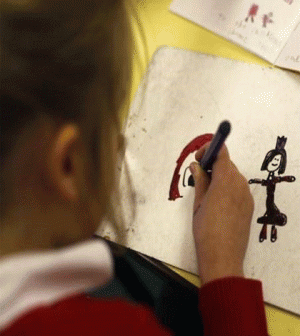- Finding Unshakable Power in a World That Wants to Pull Us ApartPosted 5 months ago
- What could a Donald Trump presidency mean for abortion rights?Posted 5 months ago
- Financial Empowerment: The Game-Changer for Women in Relationships and BeyondPosted 6 months ago
- Mental Health and Wellbeing Tips During and After PregnancyPosted 6 months ago
- Fall Renewal: Step outside your Comfort Zone & Experience Vibrant ChangePosted 6 months ago
- Women Entrepreneurs Need Support SystemsPosted 6 months ago
One in five British girls sexually harassed in school - charity

Author: Lin Taylor from trust.org
In this file December 14, 2011 photo, a pupil draws a picture at Watlington Primary School in Watlington, southern England. REUTERS/Eddie Keogh
At least one in five British women experienced unwanted sexual contact while they were in school, a children’s charity reported on Monday, and of that number, nearly half said the abuse was frequent.
After surveying more than 2,000 women in Britain, Plan UK found that 22 percent had experienced sexual touching, groping, flashing or rape during their school years.
Around 60 percent of women who said they were sexually harassed as a child have never reported the incident.
“School should be a completely safe space. When sexual harassment happens in schools, it dramatically reduces girls’ ability to engage in all of their opportunities,” Lucy Russell, Plan UK campaign manager, told the Thomson Reuters Foundation.
“It can deeply affect somebody’s confidence. Obviously it can have serious physical harm, depending on the act. And that means perhaps they’ll start dropping out [of school]. It can have long-term knock on effects for their education.”
One in three British women between 18 and 24 said they had experienced unwanted sexual contact as a schoolgirl, while one in 10 women over 65 had similar experiences.
Russell said that including older women in the survey showed that sexual harassment was not a new phenomenon, rather it is deeply entrenched in society and largely tolerated by women regardless of their age.
“This is a behaviour that girls have been told to expect. They’re being told… you should just put up with it.
“It also means that we may have grandmothers and mothers who also haven’t reported what was going on. So you’ve got a really extensive scale of hidden violence and sexual assault that’s not being talked about.
“It’s happened for generations. But this is the generation where it needs to stop.”
But with the prevalence of digital platforms and mobile messaging apps, Russell said preventing sexual abuse is increasingly difficult.
While the survey did not factor in harassment through social media and text messaging, this is a major concern for young girls, she said, as many are being pressured into distributing sexual photos of themselves by peers or boyfriends.
“Being coerced into taking those photos, not consenting to the photos being shared, being humiliated and embarrassed, and then feeling unsafe in the classroom, is a very regular experience.”
She added that school-based sexual abuse is one of the reasons why globally 66 million girls do not attend school. In some countries, girls are more susceptible to harassment on their way to and from school, or when using school toilets.
UNICEF estimates around 150 million girls around the world have been sexually assaulted.
“Whether it’s Lagos, Lima, London, (girls are) telling us: ‘We can’t get into school, we feel unsafe,'” Russell said.
(Reporting by Lin Taylor, Editing by Ros Russell; Please credit the Thomson Reuters Foundation, the charitable arm of Thomson Reuters that covers humanitarian news, property rights, human trafficking, women’s rights and climate change. Visit http://news.trust.org to see more stories)






